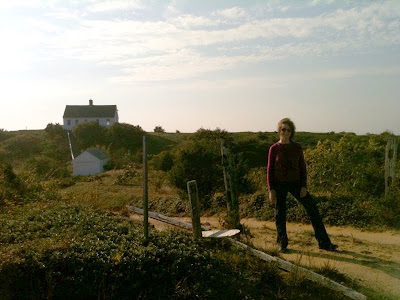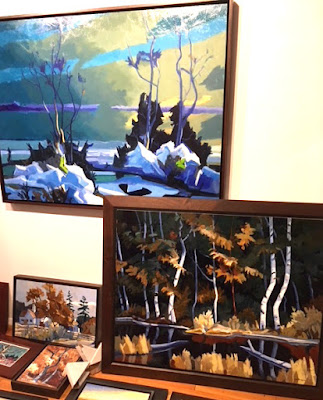Funny Edward Hopper Story
My wife Alice standing at the top of Edward
Hopper's driveway, S. Truro, MA, September 2010.
Do you notice anything missing from this scene?
A funny story about Edward Hopper, which in itself is funny as he was hardly known as an exemplar of humor. Way back in 1983 my wife Alice and I stayed in the Hopper studio for the first time. As Hopper has been almost a guiding star to me as a young artist, I was over-the-top excited. Back then the trees hadn't re-grown so high from the 19th century deforestation of Cape Cod, and one could view the Hopper studio from quite a distance. I found a particularly good view of it standing on a sand bank along the dirt road and started a panoramic oil of the studio sitting on the dunes.
The painting was going really well when an older woman came out of a nearby house and angrily yelled at me for standing on the sand bank's plants. She had a point.
I'm usually really careful about trampling the local flora. But I was determined to stand my ground and finish the painting. Unable to think of a better response, I decided to play dumb and replied to the woman by saying only "yes." After an awkward silence, she repeated her protest. I smiled as warmly as possible and nodded my head, again saying only "yes." Another uncomfortable silence ensued and I continued painting. Finally the woman, perhaps concluding she had an impossible artist on her hands, shrugged her shoulders and retreated to her house.
A minute later her grown son came out to talk to me. He apologized for his mother's edgy tone and said I should stay and finish the painting (which really did turn out beautifully). We got to talking and he explained he'd grown up on that road. Asked if he'd known Hopper he said he had, so I asked "What was he like."
"Nobody liked Hopper" he said and, pointing to the power lines running over our heads, told me a story. When the Hopper's built their studio in 1934 none of the houses on its back road had electricity. A few years later the utility company announced they would install the electical cables for the neighborhood. The normal practice was to string the power lines overhead on road side wooden poles, but for an extra fee they would bury the cables instead if the homeowners on the road would agree.
Hopper was adamant that the lines be buried, but no one else wanted to pay the extra money which angered Hopper. Apparently he let this be known to all his neighbors in a none too graceful way. Afterwards the neighbors regarded him as something of a crank.
What amazed me about this story was that Hopper is thought of in art circles as a painter who celebrated the unvarnished side of America, finding the poetry in the commonplace storefront or rail yard. So many of his paintings, like the one below, include telephone poles and power lines, yet when it came to his own yard, Hopper said no dice. Unlike his neighbors, Hopper went ahead and paid the "burial fee."
Below is a photo taken near Hopper's driveway of one of the power poles carrying the wires along the road.
Hopper's place was then the last house on the road and to this day when you come to the edge of his property, the last wooden power pole (below) stands at the end of the line as the cable then heads underground. Hopper's studio stands just to the left of this photo.
I thanked the man for his story about Hopper. Without realizing it, he was helping me come to see this hero of my youthful imagination in a more rounded way. While a complex and talented man, Hopper had his share of character faults. In many ways he could be ordinary and petty, just like the rest of us. When you grasp that on a gut level, you realize that you yourself, with all your limitations, can potentially still do exceptional things.
Below is another of the drawings I did while staying in the studio this September. It's on Mill Pond Road. which heads from the Hopper studio over to the little harbor at the mouth of the Pamet River. Hopper knew it well and did at least one watercolor of the sand bank that was just to my right as I worked on this piece.
Philip Koch, Cape Charcoal #6, vine charcoal, acrylic
wash, pastel, 9 x 12", 2010.







